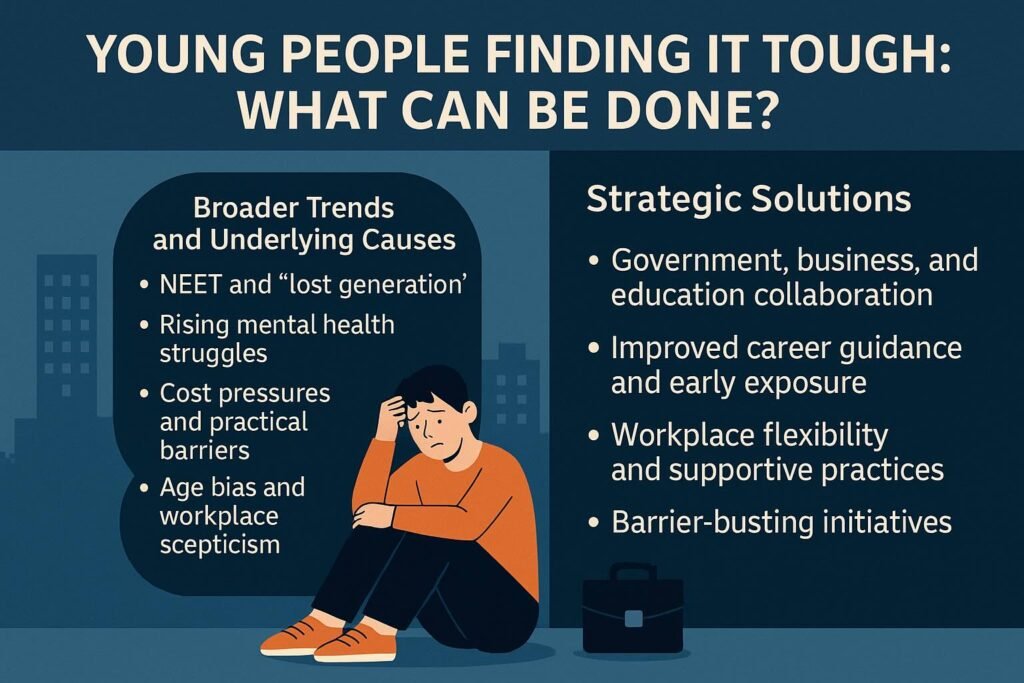The Rise of Employment Pessimism Among Generation Z
As the author of Parenting and Teaching in the age of AI, none of this surprises me but what can actually be done to make a difference for our children? Every time technology moves forward, the cognitive demands moves forward and its now creating two segments that continue to succeed. Those that work with their hands, because robotics is some way off replacing them such as plumbers and electricians and those that are truly innovative and can out think the regurgitation of the machines. Those in the middle are being squeezed out and those that want to join the job market are expected to be better than ever.

A recent BBC discussion highlighted a growing sense of employment pessimism among Generation Z, with many young jobseekers struggling to secure their first roles. Katty Kay (BBC) and Aneesh Raman (LinkedIn) explored the evolving nature of the job market and the mental and practical hurdles facing entry-level workers (BBC Global, 2024). Their conversation reflects wider global trends, with increasing numbers of young people losing confidence in their employment prospects.
Broader Trends and Underlying Causes
1. NEET and the Risk of a “Lost Generation”
Almost one million 16–24-year-olds in the UK are not in education, employment, or training (NEET). This has led to warnings of a “lost generation” unless urgent interventions are made. Employers report shrinking job vacancies, while financial insecurity combined with poor mental health is keeping many out of the workforce (Financial Times, 2024a).
2. Rising Mental Health Struggles
Young people aged 18–24 with mental health difficulties are significantly more likely to be unemployed compared to their peers. Sickness benefits related to mental health among under-25s have risen dramatically in recent years, suggesting systemic strain (The Times, 2024). Stigma in workplaces continues to discourage many from seeking help or sustaining employment.
3. Cost Pressures and Practical Barriers
Financial obstacles are a key issue. Some young people have declined job offers because they could not afford the commute or professional clothing (New York Post, 2024). Others skip work due to stress or anxiety, adding to the cycle of insecurity.
4. Age Bias and Workplace Scepticism
Research shows that more than 90 % of under-25s report negative treatment at work linked to their age, from being undervalued to being excluded from opportunities. This bias reduces motivation and erodes confidence in long-term career prospects (The Sun, 2024a).
Strategic Solutions
A. Government, Business, and Education Collaboration
Greater collaboration is needed between schools, employers, and policymakers. Investment in mental health support, skills development, and school–business partnerships can provide young people with work placements, apprenticeships, and flexible job options (Financial Times, 2024a).
B. Improved Career Guidance and Early Exposure
Enhanced career education in schools can prepare students for the workplace by exposing them to different career paths earlier. Many adults reflect that better career guidance would have improved their readiness for working life (The Sun, 2024b). Initiatives such as the Gatsby Charitable Foundation’s career guidance framework provide structured models for schools to follow (Gatsby Charitable Foundation, 2023).
C. Workplace Flexibility and Supportive Practices
Employers can support young workers by offering hybrid work, four-day weeks, and flexible scheduling. These measures are especially important for individuals managing mental health challenges (Financial Times, 2024b).
D. Barrier-Busting Initiatives
Targeted schemes to subsidise commuting, work attire, and training could make entry-level jobs more accessible. Initiatives that break down practical barriers will ensure opportunities are not lost for reasons outside of a young person’s control (New York Post, 2024).
Summary Table
| Challenge | Why It Matters | Key Action |
|---|---|---|
| NEET and job scarcity | One million young people at risk of exclusion | Youth guarantees and partnerships |
| Mental health struggles | Reduced participation and productivity | Supportive workplace policies |
| Cost barriers | Prevents job applications and acceptances | Subsidies and financial support |
| Poor career awareness | Misaligned expectations and limited opportunity views | Stronger career education |
| Age-related bias | Erodes confidence and deters engagement | Inclusive hiring and mentoring |
Conclusion
The difficulties facing Generation Z jobseekers are complex and multi-layered, ranging from economic pressures to mental health struggles and structural biases. These challenges cannot be solved by young people alone. Real solutions require coordinated efforts from governments, businesses, schools, and communities. With targeted support, better guidance, and inclusive opportunities, this generation can build sustainable and rewarding careers.
References
BBC Global. (2024). Young people can’t find jobs. What should they do? [Video]. YouTube. https://www.youtube.com/watch?v=PP1b1YhWf1U
Financial Times. (2024a, April 21). UK risks ‘lost generation’ of young workers, business warns. Financial Times. https://www.ft.com/content/6a1c4853-d827-4a15-9431-0f899f38dcd7
Financial Times. (2024b, June 18). Young people are rejecting work. Why? Financial Times. https://www.ft.com/content/609d3829-30db-4356-bc0e-04ba6ccfa5ed
The Times. (2024, October 15). My generation’s not working – AI will soon take all of our jobs. The Times. https://www.thetimes.co.uk/article/my-generations-not-working-ai-will-soon-take-all-of-our-jobs-p2lr89fmm
New York Post. (2024, November 4). Broke Gen Zs turn down jobs — claim they can’t afford commute or work clothes. New York Post. https://nypost.com/2024/11/04/lifestyle/broke-gen-zs-forfeit-jobs-over-commuting-costs-attire-report/
The Sun. (2024a, July 22). Under-25s treated negatively at work because of age, study finds. The Sun. https://www.thesun.co.uk/news/32383263/under-25-treated-negatively-at-work-because-of-age-study-finds/
The Sun. (2024b, May 10). Brits’ dream jobs reality check: Careers advice gap revealed. The Sun. https://www.thesun.co.uk/news/36514714/brit-dream-jobs-reality-check/
Gatsby Charitable Foundation. (2023). Good career guidance report. Gatsby Foundation. https://www.gatsby.org.uk/education/focus-areas/good-career-guidance
